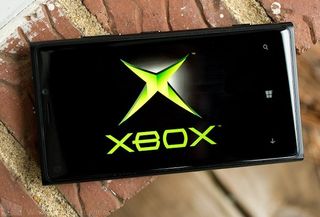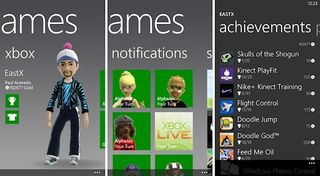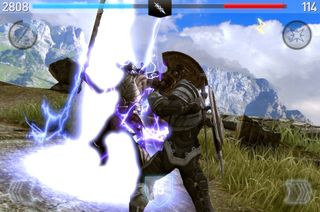How Microsoft can save Xbox games for Windows Phone: Part 2

The recent extended release drought of Xbox games for Windows Phone has prompted both game developers and players alike to question Microsoft’s commitment to Xbox Live support for its own mobile OS. For their part, Microsoft kinda-sorta reaffirmed their dedication to mobile Xbox games, and the long in-development Skulls of the Shogun finally debuts this week. Perhaps the drought has ended and Xbox Windows Phone games will blossom anew once more.
Still, all those weeks without new games didn’t happen by random chance. There are myriad underlying problems at fault, from outdated policies to poor portfolio management to a combination of apathy and ambivalence from some divisions within the platform holder itself. To anyone with an ounce of understanding of the mobile games industry, it looks bad - and it is bad. But Microsoft can still save Xbox games for Windows Phone.
We’ve already taken a critical eye towards the Xbox Live certification policies for mobile games in the first installment of this multipart series. Today we continue with a look at why Xbox games matter to Windows Phone and the missing support of popular game engines. Remember, these suggestions come from a standpoint of love and the desire to see the Xbox brand on Windows Phone grow and succeed.
Xbox Live is important to the future of Windows Phone.

A few of the key Xbox Live features for Windows Phone
Most of the suggestions in this series will seem like common sense to gamers and developers alike. But the first two suggestions of this article are actually open to debate. Specifically, these disagreements will stem from the fact that not everyone buys into the Xbox Live ecosystem – particularly people who don’t own an Xbox 360. In fact, I’m positive that several people in Microsoft’s own Windows Phone and Business Development divisions fail to see the value of the Xbox brand to Windows Phone. But Xbox features do matter, and I’ll tell you why.
The Xbox 360 is Microsoft’s most successful gaming venture; Xbox its strongest brand. At some point before the Windows Phone 7 launch, Microsoft decided to tie their new smartphone platform into that successful brand. This presents numerous advantages like a built-in audience of console owners to sell to, a brand that game developers already understand and respect, and the possibilities of connectivity between the various Xbox platforms.
Now, many 360 owners haven’t jumped onboard with Windows Phone yet for a number of reasons such as the lack of big-name Microsoft properties and exclusives – both of which I’ll address in my next article. But despite a host of missteps large enough to fill at least three editorials, one group of gamers has embraced Windows Phone in a big way: people who enjoy Xbox Live Achievements. Whatever the quality of the Xbox Windows Phone games so far, they all provide exclusive Achievements to unlock. The Achievement hunting subculture is probably the most loyal group of Windows Phone gamers - and the one most displeased by the recent release drought.
Get the Windows Central Newsletter
All the latest news, reviews, and guides for Windows and Xbox diehards.
Any way you slice it, Xbox games have been a selling point for Windows Phone since the 2010 launch. But as time passed, leadership has shifted within practically every Windows Phone-related division, resulting in the current crisis of identity and support for mobile Xbox Live.
Big games should release as Xbox titles, not indie games.

Three stellar candidates for Xbox Live status
On Xbox 360, there is a clear separation between XBLA and indie games. A major developer or publisher would never consider releasing their game without the Xbox branding. The advantages are plentiful: better visibility, a perception of higher quality, and access to Xbox Live features like Achievements and Leaderboards.
Windows Phone has the same basic division between Xbox and non-Xbox games, the latter of which carries the ‘indie’ connotation. Why then should major game makers like Disney (Where’s My Water?, Where’s Perry?) and Rebellion (Dredd vs. Zombies) publish their games without the Xbox branding? Heck, Disney actually announced an Xbox game - Toy Story Mania that failed to materialize on Windows Phone (it eventually showed up on Xbox 360). Don’t these developers know that many gamers prefer Xbox games?
Actually, Disney and Rebellion probably considered releasing their titles as Xbox games but decided it was too much trouble. Part One of this editorial explained some of the numerous Xbox Live certification hurdles that mobile developers face. The key here is that Microsoft needs to maintain that image of the best or hottest games bearing the Xbox name and doling out delicious Achievements.
If increased visibility isn’t enough to convince Disney and company to stick with Xbox Live, then offer them some incentives. Money spent to make sure Where’s My Water? bears the Xbox name on its Live tile will pay off in the form of maintaining the Xbox brand’s image and keeping gamers who prefer Xbox features happy.
Windows Phone needs game engines...

A game demo created with Unity and Autodesk Scaleform
Game engines are software suites and tools that facilitate the creation of videogames by developers. These tools provide a variety of functions that are responsible for the game’s graphics, physics, artificial intelligence, user interface, and much more. Engines make the creation and porting of games between platforms much faster and easier for developers.
Windows Phone 7 lost out on every popular game and middleware engine under the sun due to its lack of native code support (the ability for software code to interact directly with the hardware). As a result, games that rely on those engines like Epic’s Infinity Blade series couldn’t be ported to Windows Phone without drastic recoding. The lack of multiplatform engine support and the relatively underpowered Windows Phone 7 hardware kept us from receiving ports of many graphically intensive games.
Windows Phone 8 thankfully does support native code, although a fully native app doesn’t have access to many managed code APIs necessary for Xbox Live certification. More importantly, this time out Microsoft has managed to secure a number of important game engines for Windows Phone 8 such as Unity (the most popular smartphone game engine), Havok, and Autodesk Scaleform.
As far as we know, only Autodesk Scaleform is actually ready yet, owing mostly to the woefully late release of the Windows Phone 8 SDK. That means we’re a fair ways off from reaping those engines’ benefits, but at least Microsoft is making an effort.
…Particularly Unreal Engine 3.

Infinity Blade II gets its pretty looks from the Unreal Engine.
Still, one all-important engine remains unannounced: the Unreal Engine from Epic Games. Why does it matter? For one thing, a vast number of console games use Unreal Engine 3, including Batman Arkham Asylum and Arkham City, Borderlands 2, Mass Effect 3, Mortal Kombat (2011), and Wreckateer. Securing Unreal Engine 3 would make mobile adaptations of console games much easier than before (including the iOS title Batman: Arkham City Lockdown). Heck, the Microsoft-published physics game Wreckateer would be perfect for Windows Phone.
More to the point, the Unreal Engine’s ubiquity means that practically any developer who’s made a console game in the last five years already knows how to use it. As more developers leave the increasingly AAA-focused console space for mobile game development, the availability of a versatile and familiar engine could easily impact those developers’ choice of supporting Windows Phone. Also, Autodesk Scaleform already integrates with Unreal Engine 3, so why not give Scaleform the freedom to do its thing?
Possibly the most important reason for bringing Unreal Engine to Windows Phone is Chair Entertainment, a subsidiary of Epic. Chair is the developer behind the bestselling Infinity Blade series on iOS. Before they can bring Infinity Blade II to Microsoft’s mobile platform, we’ve got to have the Unreal Engine that powers it. Chair would also be perfect for a mobile Gears of War game, now wouldn’t they?
Epic announced their engine’s Windows 8 and RT support back in August, though that support hasn’t gone live yet. Microsoft and Epic are rumored to be in talks over bringing the engine to Windows Phone 8, but those talks should have successfully concluded months ago. Even if they suddenly announced support tomorrow, it would likely be months before that support went live.
Remember, the still-not-ready Unity, Havok, and Scaleform Mobile SDK were all announced between August and October. Once Unreal Engine’s hypothetical Windows Phone 8 support is ready, it will take months (if not longer) for Xbox games that make use of it to actually reach the market. Please, Microsoft: ink that deal and get Chair Entertainment onboard while Xbox Live development on Windows Phone 8 is still halfway viable.
Still more to come!
That’s it for this installment, boys and girls. We’ve got a third part coming later this week or early next week with even more varied recommendations. Do you agree with my suggestions for saving Xbox games for Windows Phone? Please voice your opinions in the comments below and tweet this article to anyone who might benefit from it.
Paul Acevedo is the Games Editor at Windows Central. A lifelong gamer, he has written about videogames for over 15 years and reviewed over 350 games for our site. Follow him on Twitter @PaulRAcevedo. Don’t hate. Appreciate!

